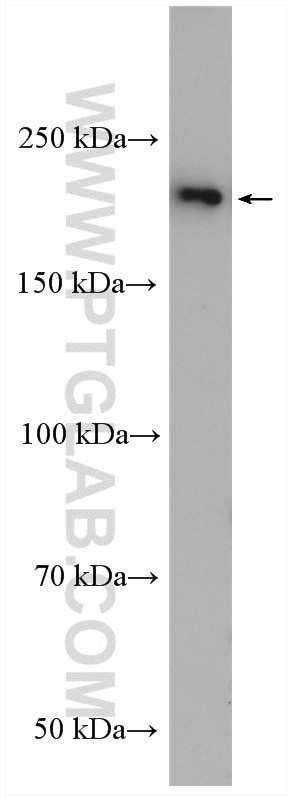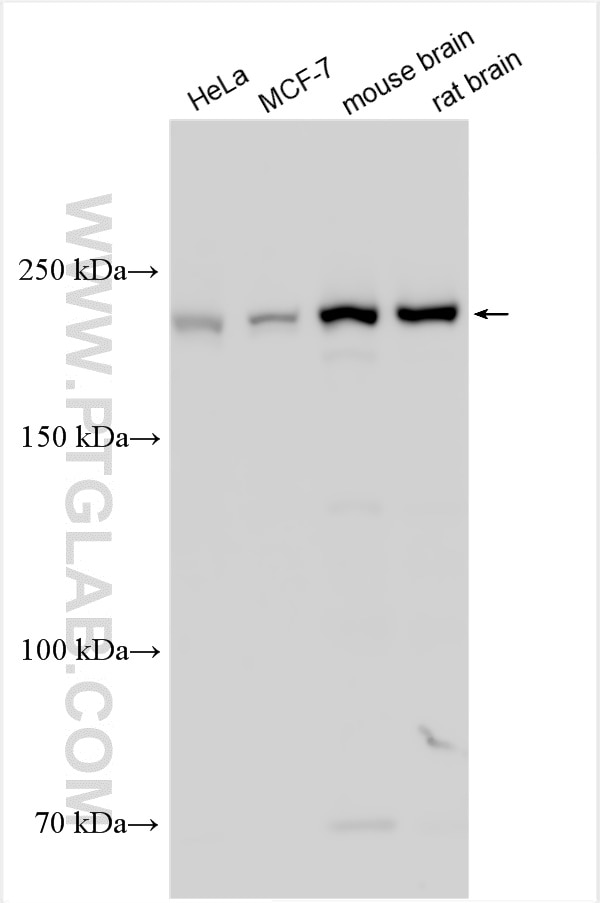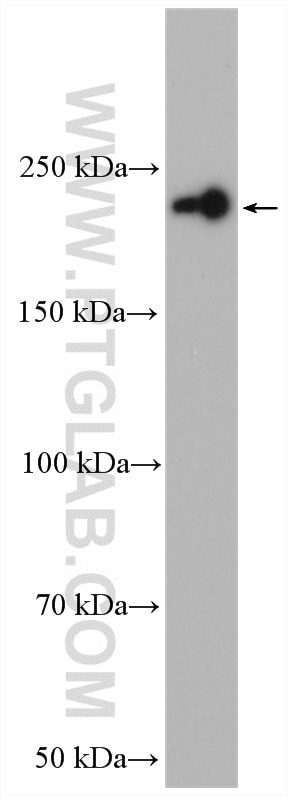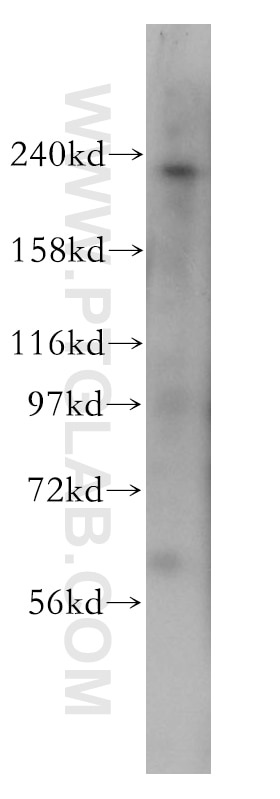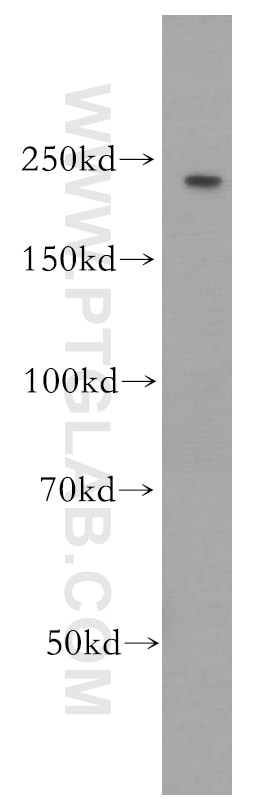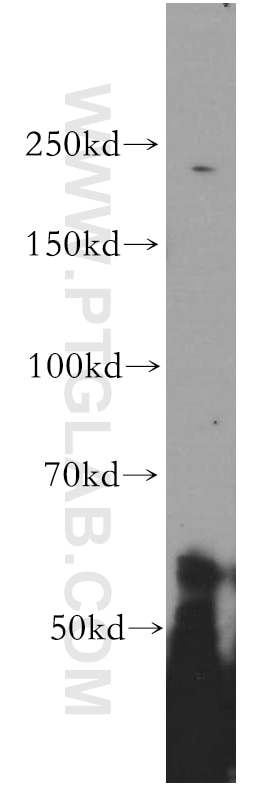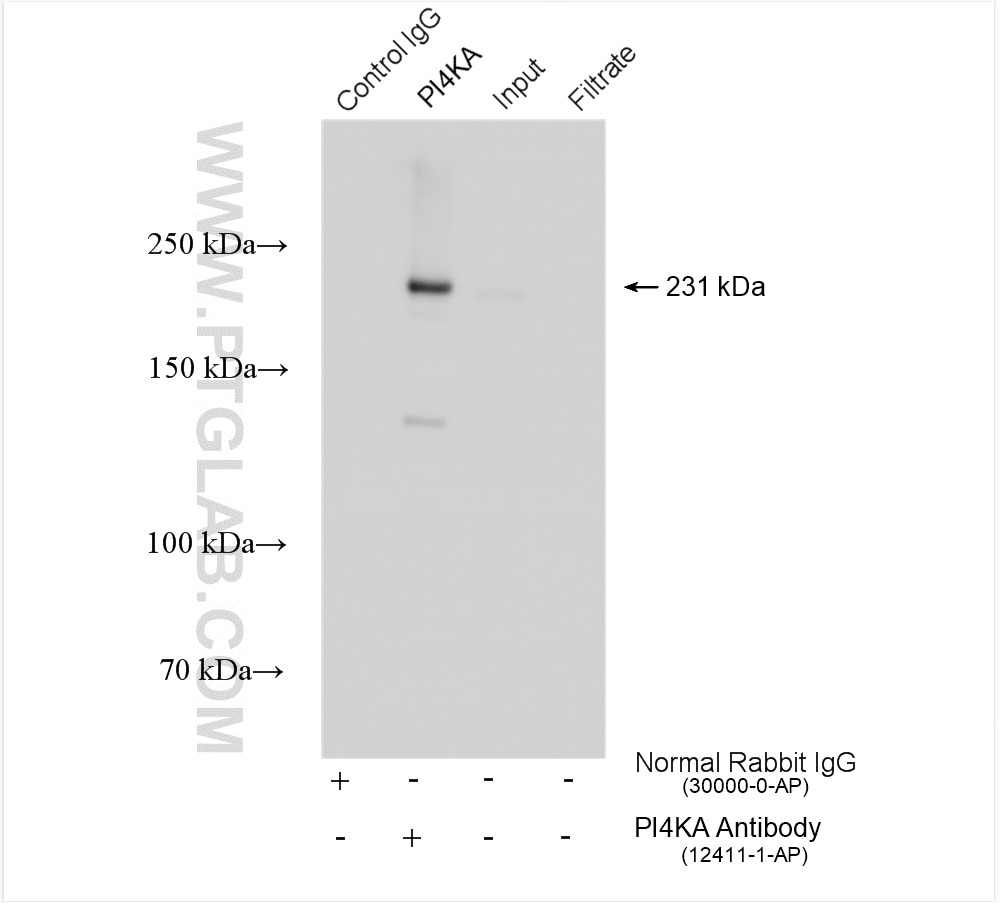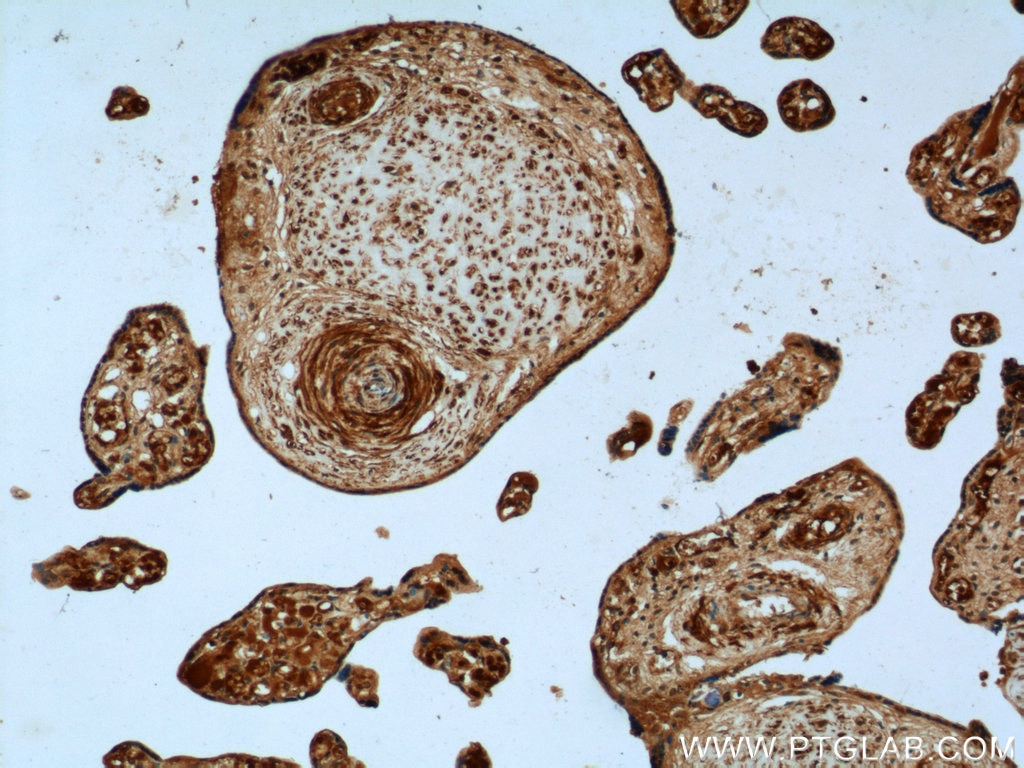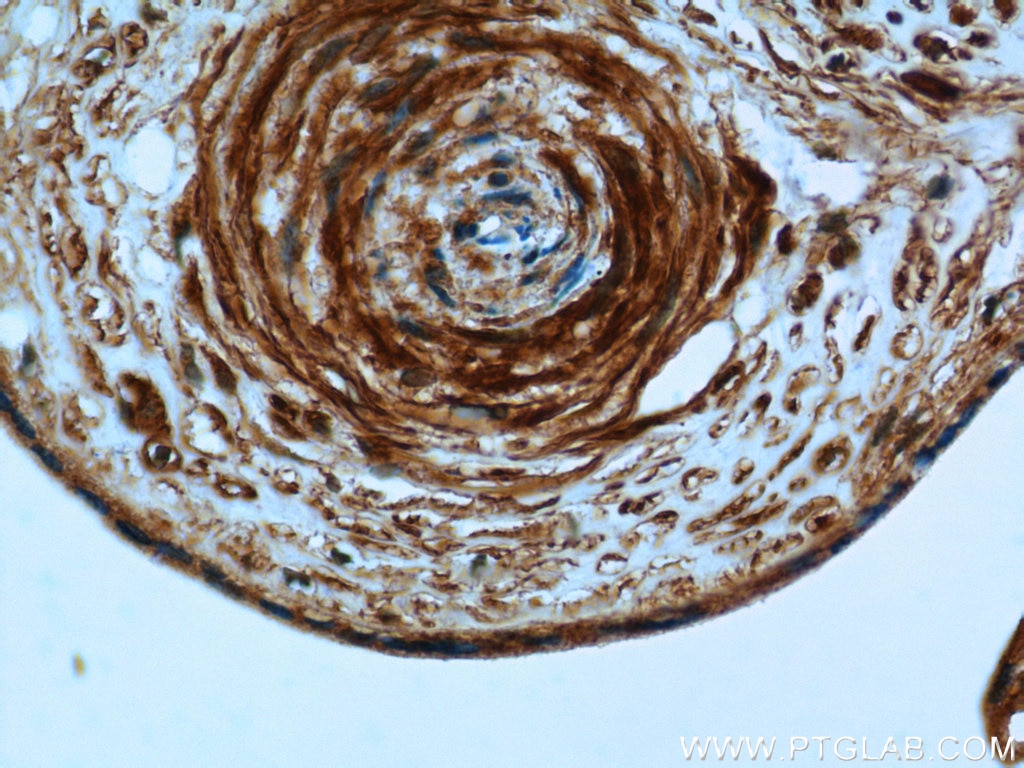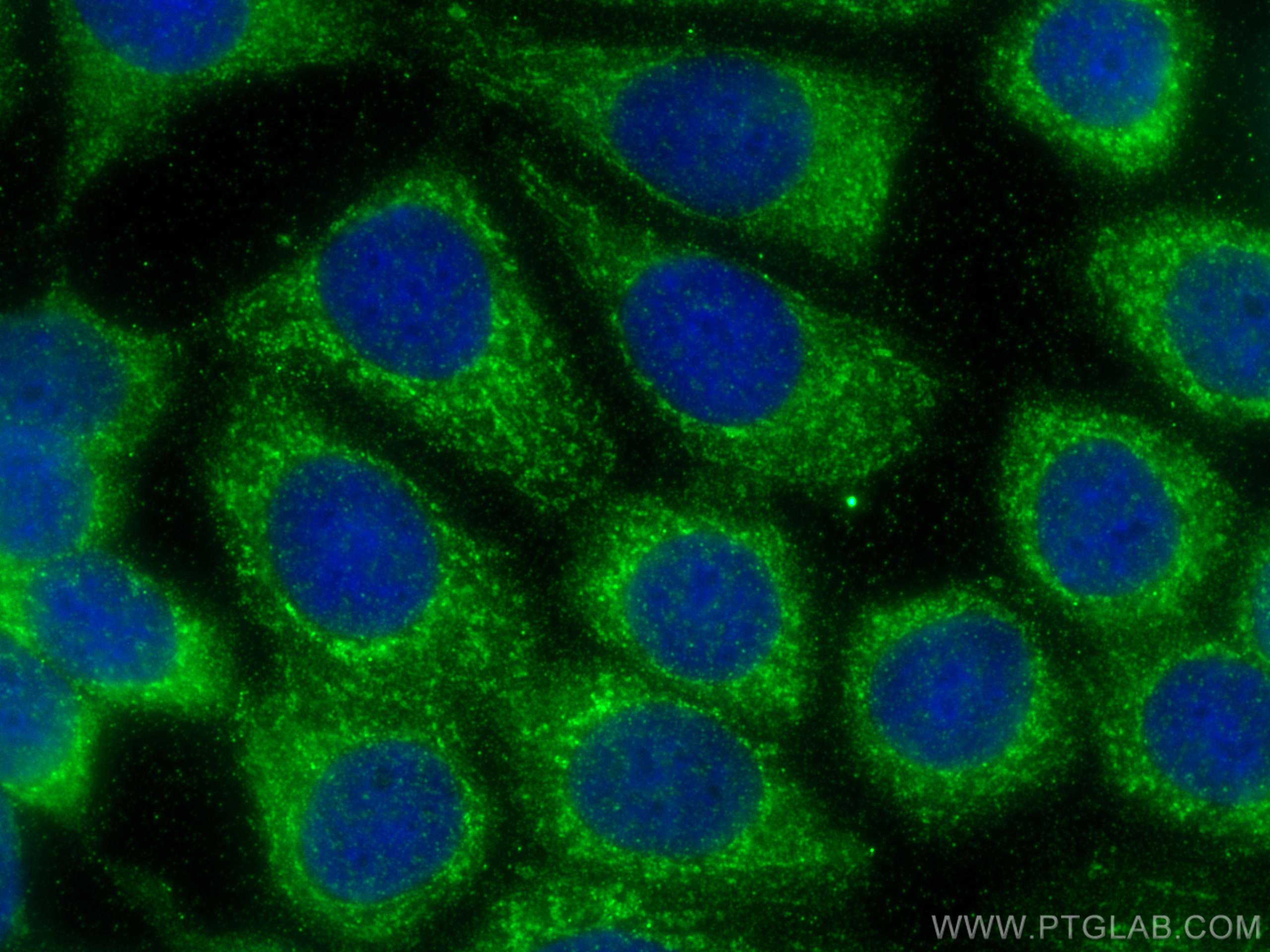- Featured Product
- KD/KO Validated
PI4KA Polyklonaler Antikörper
PI4KA Polyklonal Antikörper für WB, IF/ICC, IP, ELISA
Wirt / Isotyp
Kaninchen / IgG
Getestete Reaktivität
human, Maus, Ratte
Anwendung
WB, IHC, IF/ICC, IP, ELISA
Konjugation
Unkonjugiert
Kat-Nr. : 12411-1-AP
Synonyme
Galerie der Validierungsdaten
Geprüfte Anwendungen
| Erfolgreiche Detektion in WB | HeLa-Zellen, humanes Hirngewebe, Maushirngewebe, MCF-7-Zellen, NIH-3T3 Zellen (RNAi), Rattenhirngewebe |
| Erfolgreiche IP | Maushirngewebe |
| Erfolgreiche Detektion in IF/ICC | MCF-7-Zellen |
Empfohlene Verdünnung
| Anwendung | Verdünnung |
|---|---|
| Western Blot (WB) | WB : 1:1000-1:4000 |
| Immunpräzipitation (IP) | IP : 0.5-4.0 ug for 1.0-3.0 mg of total protein lysate |
| Immunfluoreszenz (IF)/ICC | IF/ICC : 1:200-1:800 |
| It is recommended that this reagent should be titrated in each testing system to obtain optimal results. | |
| Sample-dependent, check data in validation data gallery | |
Veröffentlichte Anwendungen
| KD/KO | See 8 publications below |
| WB | See 10 publications below |
| IHC | See 1 publications below |
| IF | See 3 publications below |
Produktinformation
12411-1-AP bindet in WB, IHC, IF/ICC, IP, ELISA PI4KA und zeigt Reaktivität mit human, Maus, Ratten
| Getestete Reaktivität | human, Maus, Ratte |
| In Publikationen genannte Reaktivität | human, Maus |
| Wirt / Isotyp | Kaninchen / IgG |
| Klonalität | Polyklonal |
| Typ | Antikörper |
| Immunogen | PI4KA fusion protein Ag3062 |
| Vollständiger Name | phosphatidylinositol 4-kinase, catalytic, alpha |
| Berechnetes Molekulargewicht | 2044 aa, 231 kDa |
| Beobachtetes Molekulargewicht | 231 kDa |
| GenBank-Zugangsnummer | BC018120 |
| Gene symbol | PI4KA |
| Gene ID (NCBI) | 5297 |
| Konjugation | Unkonjugiert |
| Form | Liquid |
| Reinigungsmethode | Antigen-Affinitätsreinigung |
| Lagerungspuffer | PBS mit 0.02% Natriumazid und 50% Glycerin pH 7.3. |
| Lagerungsbedingungen | Bei -20°C lagern. Nach dem Versand ein Jahr lang stabil Aliquotieren ist bei -20oC Lagerung nicht notwendig. 20ul Größen enthalten 0,1% BSA. |
Hintergrundinformationen
PI4KA, also named as PIK4, PIK4CA, belongs to the PI3/PI4-kinase family and Type III PI4K subfamily. It acts on phosphatidylinositol (PtdIns) in the first committed step in the production of the second messenger inositol-1,4,5,-trisphosphate. PI4KA plays a role in the formation of membrane complexes where HCV replication takes place. (PMID:19605471).
Protokolle
| Produktspezifische Protokolle | |
|---|---|
| WB protocol for PI4KA antibody 12411-1-AP | Protokoll herunterladen |
| IHC protocol for PI4KA antibody 12411-1-AP | Protokoll herunterladen |
| IF protocol for PI4KA antibody 12411-1-AP | Protokoll herunterladen |
| IP protocol for PI4KA antibody 12411-1-AP | Protokoll herunterladen |
| Standard-Protokolle | |
|---|---|
| Klicken Sie hier, um unsere Standardprotokolle anzuzeigen |
Publikationen
| Species | Application | Title |
|---|---|---|
Science Golgi-derived PI(4)P-containing vesicles drive late steps of mitochondrial division.
| ||
Brain Biallelic PI4KA variants cause a novel neurodevelopmental syndrome with hypomyelinating leukodystrophy. | ||
EMBO J Defining the proximal interaction networks of Arf GTPases reveals a mechanism for the regulation of PLD1 and PI4KB. | ||
Cell Rep A Forward Genetic Screen Targeting the Endothelium Reveals a Regulatory Role for the Lipid Kinase Pi4ka in Myelo- and Erythropoiesis.
| ||
Biomaterials Nrf-2-driven long noncoding RNA ODRUL contributes to modulating silver nanoparticle-induced effects on erythroid cells.
|
Rezensionen
The reviews below have been submitted by verified Proteintech customers who received an incentive for providing their feedback.
FH Patricia (Verified Customer) (06-16-2024) | Works well with 30ug of cell lysate
|
